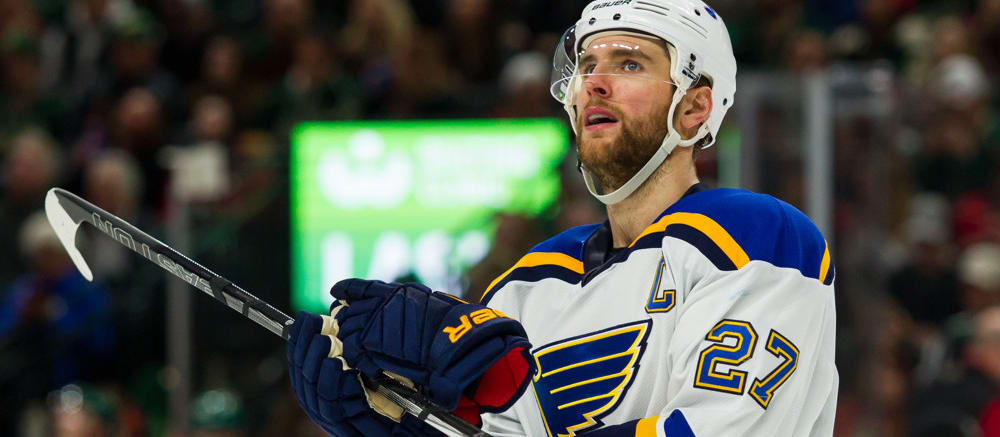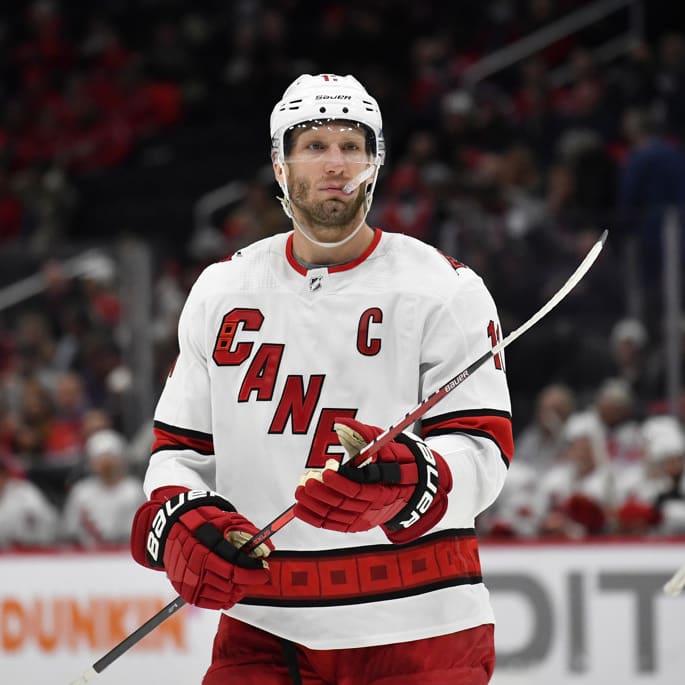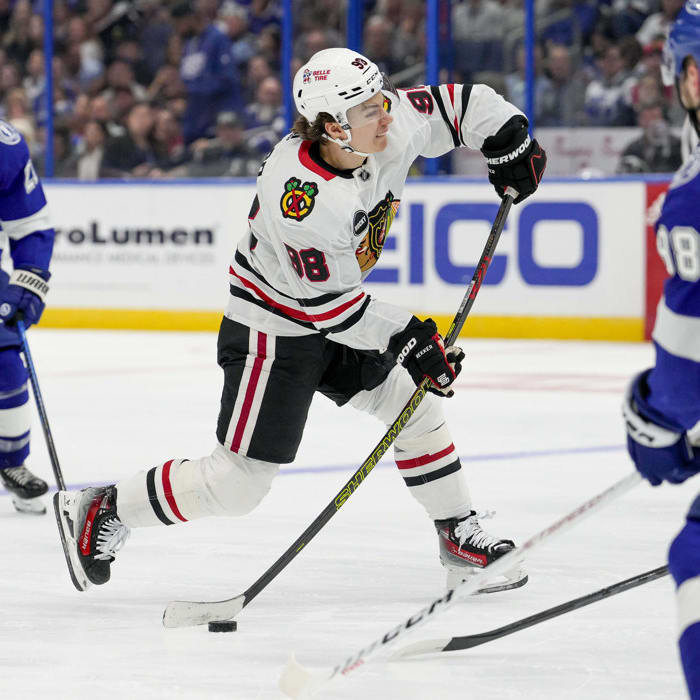The landscape for defensemen continues to change. With an emphasis on mobility and puck-moving ability, the players getting paid are the ones who can quarterback a power play, and not the physical behemoths that (supposedly) strike fear into the hearts of opposing forwards. Alex Pietrangelo's big move to Vegas sent ripples across the league, and a number of teams – Pittsburgh, St. Louis, Vancouver, Calgary, Toronto among them – have made some drastic changes. Here's a breakdown of the impact defensemen who have signed with new teams this offseason.
(All advanced stats courtesy of Natural Stat Trick.)
The Skinny: Vegas signs Alex Pietrangelo for seven years worth $61.6 million.
The Raw Numbers: He's had four straight seasons of double-digit goals, his career low for points in a season (lockout excluded) is 41, he ranked in the top 10 in just about everything among defensemen last season: points (52, 6th), goals (16, 1st), power-play points (22, 6th), shots (225, 2nd), playing time (24:11, 14th), and he also finished top-5 in Norris voting for the third time. He is also, of course, a Stanley Cup champion.
The Impact: Pietrangelo's signing had significant ramifications, first with the Blues signing Torey Krug when they realized they could lose out on both, and then with Vegas shipping out Nate Schmidt. Pietrangelo gives Vegas a strong veteran presence on their right side, which previously had only one right-handed shooter in Zach Whitecloud. This will likely result in Alec Martinez moving back to the left side even though he can play the right, and will give the Knights a strong 1-2 punch on the right side with Shea Theodore and Pietrangelo. How that relationship will work out will be interesting to watch; both Theodore and Pietrangelo are elite power-play quarterbacks, though the incumbent Theodore has the slight edge in advanced metrics. It's possible the Knights play both on the top unit with Theodore as the rover, but it's reasonable to expect Pietrangelo's fantasy value to take a hit since he has to share power play duties. Both Pietrangelo and Theodore are top-15 defensemen in leagues that emphasize points and not peripherals.
The Skinny: St. Louis signs Torey Krug for seven years worth $45.5 million.
The Raw Numbers: Since Krug's rookie season in 2013-14 (min. 300 GP), he ranks eighth in assists (268), third in primary assists on the power play, fifth in power-play points (159), third in power-play points/60 (5.72) seventh in shots (1,332) and fifth in shot attempts (1,340).
The Impact: Krug and Pietrangelo had comparable numbers in 2019-20, but the real difference lies in their styles. Krug is an instinctive, feisty, agile lefty who jumps up in the play a fair amount, while Pietrangelo is more of a thinker, less about improvisation and more about steadiness and balance. That will likely change the dynamic of a Blues power play that ranked third in the league last year, but Krug is no doubt going to run it, and given his history he should have no trouble doing so. At 5-on-5, depending on Jay Bouwmeester's status, Krug may play a bigger role than he did in Boston, most likely on the top pair with Colton Parayko. Krug is a step below the elite class (Carlson, Josi and Hedman) though the gap isn't particularly big and he'll remain a top-15 fantasy defenseman in the same tier as Pietrangelo and Theodore.
The Skinny: Edmonton signs Tyson Barrie for one year worth $3.75 million.
The Raw Numbers: With 39 points in 70 games with Toronto, Barrie wasn't that bad last year. He did, however, perform well below expectations and finished with just 12 power-play points, which ranked 30th in the league, a far drop from when he finished sixth (25 power-play points) in 2018-19 and third (30 power-play points) in 2017-18, and Toronto's power play finished a disappointing 15th in 2019-20 at just 15.4% conversion rate. Barrie averaged 45.5 shots on the power play in his four most recent seasons with Colorado, but had just 19 with Toronto last season. Among Leafs who played at least 100 minutes with the man advantage, Barrie ranked last with 6.1 shots/60 in 2019-20.
The Impact: Part of Barrie's down year was related to the fact that the Leafs power play relies so much on Auston Matthews (20.4 power-play shots/60). Even before leaving for Toronto, Barrie's shots/60 had declined because Nathan MacKinnon (19.7 power-play shots/60 in '18-'19) had become a superstar and much more of a focal point. Connor McDavid and Leon Draisaitl share the shooting duties fairly evenly on the Edmonton power play, which finished first in the league last year and was historically one of the best in the modern era, so the addition of Barrie – who will simply replace the injured Oscar Klefbom – may be a marginal improvement. Barrie's goal is to pull off a successful revenge tour like Kevin Shattenkirk, but even Shattenkirk scored just 34 points (seven on the power play) while recouping some lost value simply by being more consistent and reliable. Barrie remains a borderline top-20 fantasy defenseman but it's going to be difficult for him to be a top-10 quarterback again.
The Skinny: Anaheim signs Kevin Shattenkirk for three years worth $11.7 million.
The Raw Numbers: Shattenkirk claimed a Cup title in his revenge tour and improved his numbers across the board: 8 goals (+6 from 2018-19), 34 points (+6), plus-22 (+37), 6.1 shooting % (+4.7). Obviously, playing on a better team helps, finishing with a 53.33 Corsi For % with Tampa after two straight seasons of sub-50 CF% with the Rangers. Since breaking into the league, Shattenkirk is tied-eighth with 172 power-play points, but over the past three seasons he's tied for 51st.
The Impact: Shattenkirk gives the Ducks a proper quarterback after they regrettably traded Shea Theodore and used Cam Fowler and Hampus Lindholm to little avail. But how much will Shattenkirk really improve Anaheim's 30th-ranked power play? Even at his best, Shattenkirk was a complementary player last year, and no Ducks player scored double-digit points with the man advantage in 2019-20. He's going to be passing the puck to forwards who are either too old (Ryan Getzlaf), miscast (Adam Henrique) or lacking elite finishing ability (Rickard Rakell). The Ducks' real hope for a quality power play lies in the play of Sam Steel, Troy Terry and Trevor Zegras, all of whom are still a couple seasons away from top-six status. Shattenkirk is a low-end power-play QB but still conservatively ranks in the top 30 among defensemen if you can stomach a poor plus-minus.











